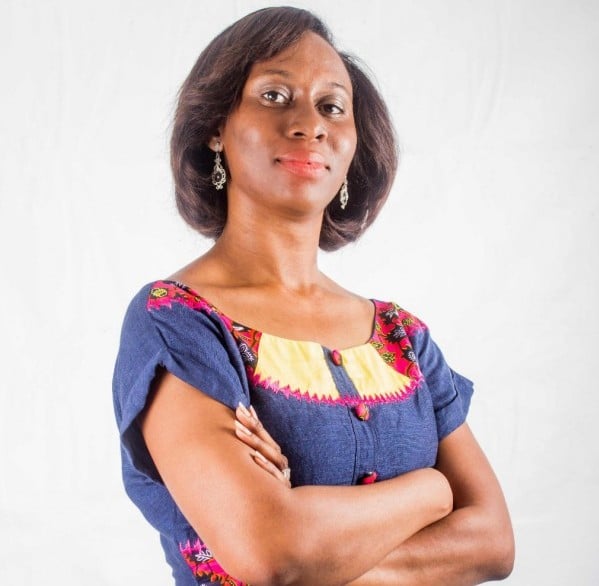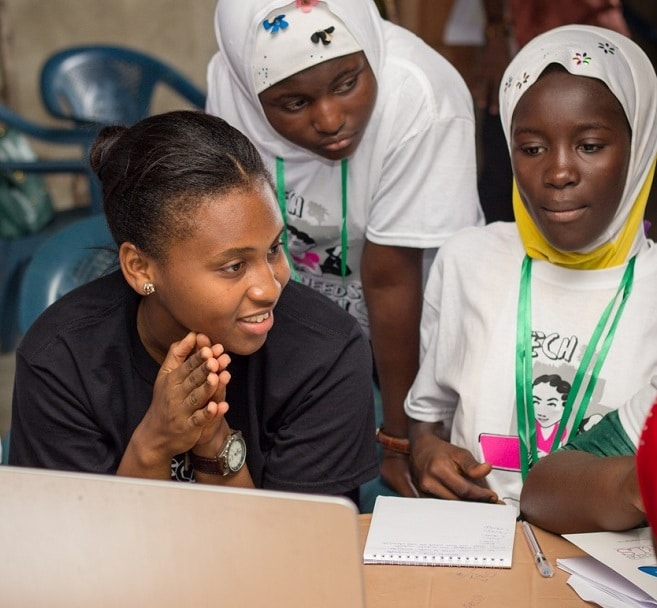Ethel Cofie, a self-proclaimed techie and CEO of Edel Consultancy, has been using her love for technology to provide solutions for socio-economic issues in Africa. She is currently finishing up her studies at Yale University through the Washington Fellowship, a program for young African leaders to build leadership and management skills. When she is not spending her time supporting startups, building apps to support women’s health or improving her skills at Ivy League universities, she can be found working on narrowing the gap between men and women in the tech industry.
Q: What are three terms that describe your professional journey?
Persistence
I worked for one of my professors who taught computer science, when I was a university student back in Ghana. I was 21, and he was letting me weigh in on these huge discussions that were way above my head. This exposure helped to inform my career journey.
This encouraged me to be a businesswoman. I started a business in 2010. I felt I was pretty passionate and intelligent. In terms of what happened, I got really interesting jobs working across Africa. I failed a lot along the way but learned many lessons, which made it easier to get back up and try again. So persistence was key in my development as a professional and a businesswoman.
Awareness
One of my last corporate jobs before I started my tech company was being head of commercial solutions for Vodafone Ghana.
As women, we work hard, and because of it, we should be acknowledged for it. However, that acknowledgement doesn’t always come. I learned how to be aware of emotional intelligence, and I learned that working hard is not enough. It is important for professionals, women especially, to be able to walk into a room and be aware of who is in the room, the motivations of the individuals in that room, recognize the synergy and how to work with them. Once I realized that, it made things easier for me.
Hard work
It is pretty self-explanatory. I work as hard as possible to accomplish my goals.
Q: Explain the function of your position as a technical product/solutions manager. How do you assist your clients?
From a technical perspective, I describe myself as technical product/solutions manager. I am sort of the person that is in the middle of technical expertise and customer design. I’m a techie that is focused on customer service products.
When working with clients, I first like to start by testing the customer journey out before I build anything. I like to sit with a client and understand what their business is and who their customers are and what is the company’s path. Once that happens, I can begin to build tools that work.
So there’s an anthropological component to how I approach my work. That makes the technology part successful beyond just a working tech product.
Q: What does a typical workday look like for you?
OK, so apart from running Edel Consultancy, I also run a women-in-tech group in Ghana, and I’m working with women-in-tech groups across Africa to create an alliance.
I am also working to create an accelerator for StartUp Africa. So right now, my days are a little everywhere. Literally, I have a plan for what I’m achieving for each quarter. So, essentially, no day at the moment looks the same. I could be doing a client brief, business development, working with multinational companies that are coming into Africa and helping them with technical solutions.
Q: What is one project that you worked on that you were really proud of?
I worked with the Gates Foundation to build a mobile app that enabled pregnant women to know when to go to the hospital and what medicine they should be taking. I also built one for nurses to track their patients. That did really well. It was piloted in Ghana and then deployed to other countries like Tanzania and Uganda and other countries across Africa. This was work that I was really excited about doing, and I want to continue to do that kind of work.
Q: How did you get involved with the Washington Fellowship?
It’s actually funny how I got involved. I initially did not want to apply for it. I’ve been so busy, and I have all these other projects that I didn’t want to add this to my plate. My husband was the one who told me about it, and although I was reluctant, he wouldn’t let it go. So to avoid a big argument, I just applied, and I actually was called to be interviewed. From there, I was accepted.
The program is a wonderful initiative that [President Barack] Obama created called the Young African Leaders Initiative where 500 young leaders are chosen to receive leadership and management training in the United States.
I spent six weeks at Yale receiving the training. I had the opportunity to meet with President Obama and the first lady. I also met with United Nations ambassadors and government leaders.
The experience has been great. They encourage you to work on a project before the end of the fellowship, so I have been working on this accelerator program StartUp Africa.
The goal is to support startups that are in their nascent stages and help them to get access to networks, funding and the exposure to triple their chances of surviving. Seventy to 80 percent of startups fold within the first year. I realized that I wanted to help startups but doing that in a way that is structured. I sought after startups that wanted to launch in multiple markets because it seems more profitable. The accelerator program is a three-month program. A lot of the work is virtual. And we are recruiting other people to help, such as mentors.
I have always had the idea in my head for ages, but I just couldn’t do anything about it just because of timing. Being a part of the fellowship allowed me to access additional resources and support to make it easier to execute the idea.
Q: You are very involved in a lot of different projects. Tell me more about the work you are doing with BarCamp Africa UK.
BarCamp Africa UK started in 2009. I did my master’s in the UK, and I realized there are a lot of Africans in the diaspora in the UK, and I wanted to find a way to bring those skills that these people have and bring them to Africa. I reached on social media. I shared my ideas and left it there. Then people started to reach out saying they are ready to help. And so that’s how we ended up forming this with five or six people.
Essentially, this initiative was about connecting Africans in the UK and having them network. We want to work with organizations doing things on the ground who need our help. So for instance, the Gates Foundation or social enterprises who could use our help, which could be developing an app or putting together a marketing strategy or business plan. We would take all these diverse skill sets into one room and put them to work for four or five hours. The question we posed was: What could you do to help the continent in four to five hours? This is much harder to do than just a conference. So right now, we are partnering with an organization this year that is doing something similar to our initiative.
BarCamp Africa UK was sort of my first move to doing all the things I do now. It gave me the confidence and provided me with a strong network.
Q: What are some of the challenges you experience in the work that you do?
So I run a women’s tech group in Ghana because I strongly believe that women are underrepresented in the industry. We need to help support women in the field. My efforts have been deemed feminist. Or sometimes, I will get asked questions like: How are you married doing all of this?
It is important for me to help women in the tech field, but it is a challenge convincing people that my passion to support women does not mean I’m against everyone else.
The other challenge is travel. I’m married, and my husband and I travel a lot, so the separation can be hard. I’m grateful though because despite the challenge of travel, he is very supportive. He double-checks all my work. He’s a great teammate.
Q: What are your overall thoughts about women, specifically women of color, in the STEM fields?
Women in technology are extremely underrepresented. Having diversity in your organization helps with diversity of thought and that helps with the bottom line. If your aim is to profit, it just makes sense to have diversity. You will not grow as a business without that.
Women in the tech field has improved, but there is still a lot of work that needs to be done. I’ve been thinking about how I could partner with different organizations to narrow the gap. I’ve said this a couple of times. It’s easy for me to be a part of the boys’ club because I’m in tech and a bit boisterous. But a lot of women think tech is a bit of a boys’ club, and it’s hard to penetrate that. Well, I’m trying to create a girls’ club to provide women with the resources and networks.
We need more of these groups to help support women so they can do this on their own.


